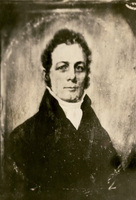 | Back to e-WV
| Back to e-WV
 The West Virginia Encyclopedia
The West Virginia Encyclopedia
 | Back to e-WV
| Back to e-WV
 The West Virginia Encyclopedia
The West Virginia Encyclopedia

John George Jackson (September 22, 1777-March 28, 1825) was a legislator, congressman, federal judge, industrial entrepreneur, and land speculator. He was born near Buckhannon, the son of George and Elizabeth Brake Jackson. With little formal education, he became well versed in the classics, with a proficiency in Latin and Greek, the law, and such practical subjects as surveying. In 1798–1801 and 1811–12, Jackson represented Harrison County in the Virginia House of Delegates, where he pressed for constitutional reforms in voting and legislative representation. He was one of the chief promoters of the Staunton Convention of 1816, which debated Virginia’s sectionalism and changes to the state constitution.
As the representative of the First District of Virginia in Congress in 1803–10 and 1813–17, Jackson was a staunch Jeffersonian Republican and states’ rights advocate. He was regarded as a spokesman for his brother-in-law, President James Madison, and engaged in fiery debates with opponents of the administration. In 1809, one encounter produced a duel with North Carolina Congressman Joseph Pierson. Although the legislature appointed Jackson a brigadier general in the Virginia militia during the War of 1812, he resigned his post due to disagreements with regular army officers. Upon returning to Congress in 1813, he supported nationalistic policies, including a protective tariff and a national bank. President James Monroe appointed Jackson a federal judge in 1819 for the newly established District of Virginia West of the Allegheny Mountains, a position he held until his death.
Along with extensive land holdings in West Virginia and Ohio and a successful law practice, Jackson emerged by 1812 as one of the foremost businessmen of the upper Monongahela Valley. Near his Clarksburg residence, he developed an industrial community known as Miles End that included gristmills, a woolen and cotton factory, ironworks, and salt works. He helped organize the Virginia Saline Bank at Clarksburg and in 1817 became the president and chief stockholder of the Monongahela Navigation Company, which constructed locks and dams on the West Fork River.
In 1800, Jackson married Mary Payne, a sister of Dolley Madison. Two years after her death in 1808, Jackson married Mary Sophia Meigs, the daughter of U.S. postmaster-general Return Jonathan Meigs, Jr. Following a rapid decline in his health, Jackson died of an apparent stroke and is buried beside both his wives in Clarksburg.
Written by Stephen W. Brown
Brown, Stephen W. Voice of the New West: John G. Jackson, his Life and Times. Macon, GA: Mercer University Press, 1985.
Davis, Dorothy. John George Jackson. Parsons: McClain, 1976.